AMD's latest flagship chipset, the 890FX, has
arrived in the form of the MSI 890FXA-GD70 motherboard. This socket AM3
mainboard is designed from the ground up for performance enthusiasts and
promises innovations like native
SATA 6Gb/s, USB 3.0, increased PCI Express 2.0 bandwidth for ATI Radeon
videocards in four-way Crossfire, and support for 45nm AMD processors up to 140W
TDP including 6-core Phenom II X6 processors. PCSTATS is testing the MSI 890FXA-GD70 with
the AMD Phenom II X6 1090T CPU, a 3.2GHz six-core processor which is
launching alongside the AMD 890FX chipset.
MSI's 890FXA-GD70 is supports all socket AM3 CPUs,
including AMD Phenom II X6/X4/X3/X2, Athlon II X4/X3/X2 and AM3-based Sempron processors. Socket AM3 exclusivity
also means this motherboard supports DDR3 memory only. The MSI 890FXA-GD70
has four memory DIMMs with capacity for up to 16GB (64-bit) /
4GB (32-bit) of DDR3-1066/1333/1600(OC) RAM. The AMD 890FX chipset uses HyperTransport 3 at
5.2GT/s and is paired off with AMDs SB850 southbridge.
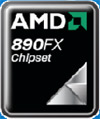 If you're
familiar with the AMD 890GX, then you know what to expect. The
major difference between these two 890-class chipsets, apart from the lack of
an IGP, is that AMD has loaded the 890FX chipset with 42 total lanes
of PCI Express 2.0 bandwidth. That translates to 21000MB/s of aggregated device-to-system bandwidth, nearly double the 22 lanes of PCI Express 2.0 bandwidth
you'd find on the AMD 890GX motherboard. Make
no mistake, AMD's flagship 890FX chipset is designed for multi-videocard gaming on a grand
scale!
If you're
familiar with the AMD 890GX, then you know what to expect. The
major difference between these two 890-class chipsets, apart from the lack of
an IGP, is that AMD has loaded the 890FX chipset with 42 total lanes
of PCI Express 2.0 bandwidth. That translates to 21000MB/s of aggregated device-to-system bandwidth, nearly double the 22 lanes of PCI Express 2.0 bandwidth
you'd find on the AMD 890GX motherboard. Make
no mistake, AMD's flagship 890FX chipset is designed for multi-videocard gaming on a grand
scale!
With this enthusiast class motherboard from MSI, the maker has dedicated 32 lanes from
the 890FX total available PCI Express 2.0 bandwidth for videocards, spreading it over
four PCI Express 2.0 x16 slots. If two of the slots are populated
with Radeon videocards in CrossfireX, each graphics card will run in (x16/x16) mode.
Populating all four slots with Radeon videocards will turn the system
into a massive (x8/x8/x8/x8) CrossfireX array. A fifth PCI Express x16 slot for peripherals runs
in (x4) mode, and there's a single PCI Express 2.0 x1 slot as well as a PCI slot
for older hardware.
On top of all this, MSI are betting hard that 2010 will be the year it
reclaims dominance from ASUS and GIGABYTE, which unquestionably own the
motherboard market right now. MSI has packed the 890FXA-GD70 motherboard
with extensive overclocking tools, BIOS-level voltage adjustments, board-level
features like a Port 80 card and diagnostic LEDs, and very selectively chosen
mil-spec grade electrical components - specifically electrolytic Tantalum
capacitors. MSI's 890FXA-GD70 is also the only board which is capable of
(potentially) unlocking certain quad-core AMD CPUs to 6-core.
 |
|
MSI 890FXA-GD70 Motherboard
|
|
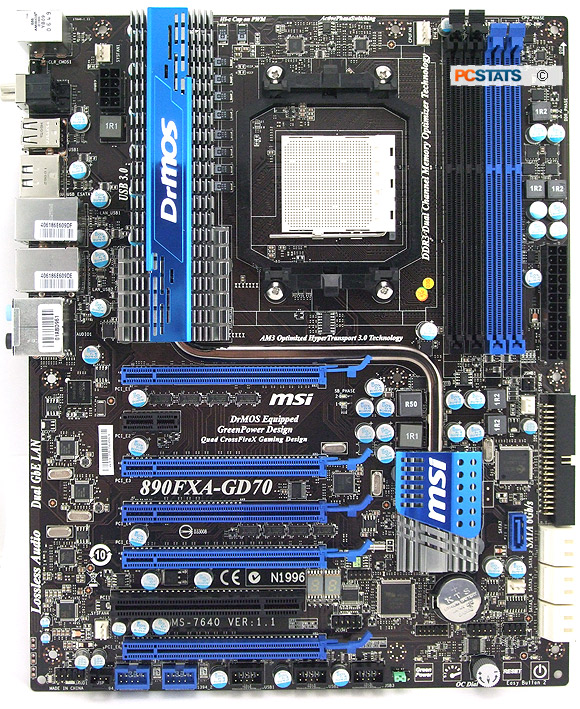
 |
|
|
|
INCLUDES: User's Manual,
Driver CD, (4) SATA cable, I/O Shield, IDE cable, CrossfireX
bridge, USB bracket, molex-to-sata power adapter. |
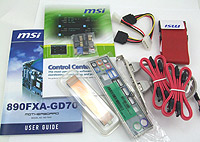
|
|
Chipsets: AMD 890FX /
SB850
CPU Support: AMD Socket
AM3
Memory Type: Dual Channel
DDR3
Videocard Support: (2) PCI Express
x16 or (4) PCI Express x8 | |
| |
The flagship AMD 890FX chipset is the cornerstone of AMD's Vision platform, designed
for performance enthusiasts and extreme gamers. The Vision platform prompts
users to pair 890FX-based motherboards like the MSI 890FXA-GD70 with multiple
AMD Radeon HD 5800-series videocards and AMD's latest Phenom II X6 processors
together for a better computing experience. The MSI 890FXA-GD70 motherboard retails
retail for roughly $200 CDN, ($200
USD, £130 GBP) at launch.
In terms of storage devices, MSI have equipped the 890FXA-GD70 board
with six SATA 6GB/s ports (RAID 0/1/5/10) via the AMD SB850. The AMD SB850
is the first southbridge to bring native support for SATA 6Gb/s connections (ie.
SATA III/3) into the PC. A JMicron JMB363 controller supplies two
additional 3Gb/s SATA II ports (one combo eSATA II/USB 2.0) and an IDE
connector for legacy storage devices. We would have liked it better if the
890FXA-GD70 had two eSATA ports on rear I/O for a little more
future-proofing... just one eSATA port doesn't seem like enough.
|
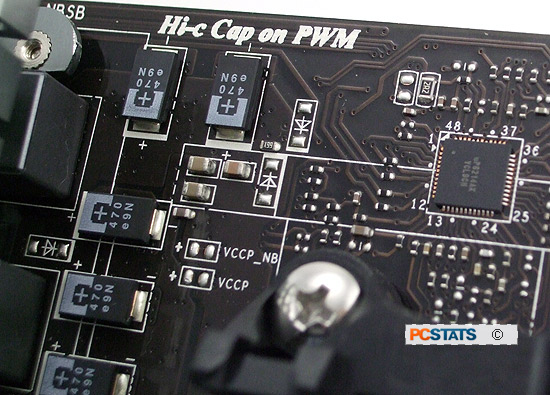
MSI touts the qualities of Hi-C
capacitors (SMD Electrolytic Tantalum capacitors) which it claims help enable
greater overclocking.
|
Two USB 3.0 ports are supplied at the rear I/O care of the
ubiquitous NEC D720200F1 USB 3.0 controller. SuperSpeed USB 3.0 runs at
4.8Gb/s, an order of magnitude faster than USB 2.0 and will likely displace
eSATA in the near future since it's both faster and self-powered. Rounding
out the features are eleven USB 2.0 ports (six via headers), two Firewire
headers and a pair of gigabit LAN RJ45 network jacks. High Definition
8-channel audio with coaxial RCA/optical SPDIF comes standard. The
audio sub-system supports Blu-ray audio up to 24-bit/192kHz .
MSI's Got Extensive Overclocking Features
MSI's 890FXA-GD70 motherboard comes with a boatload of hardware overclocking
tools that let you tune your processor and system performance directly from the
motherboard. If you like playing with knobs and switches you'll fast fall in
love with this enthusiast friendly board.
Electrically, MSI have selected Tantalum High-C capacitors and
lower-temperature Super Ferrite core chokes for the CPU power area, in addition
to the standard crop of low ESR solid state aluminum capacitors used throughout
the motherboard. The Tantalum caps have 1.6M hr lifetime, while the Super
Ferrite core chokes operate cooler and provide more stable power, according to
MSI.
OC Genie Lite in the BIOS will
automatically overclock your system for you, with the press of a button. In
PCSTATS tests, MSI OC Genie pushed the 3.2GHz Phenom II X6 1090T processor to
3.9GHz in a snap.
MSI Unlock CPU Core is a BIOS level tool that does just what
it says. The difference is that it can unlock 2, 4 or 6 cores on a processor.
MSI has added this feature to all of its 800-series motherboards. While we can't
give you an exact CPU model to try this out on (and remember that core unlocking
results are luck of the draw) the performance trend MSI are selling with
these overclocking features runs along these lines: buy a cheap two core
chip, unlock extra two cores and then overclock the heck out it for MASSIVE free
gains. In theory it sounds great, but often AMD's value-oriented processors have
smaller levels of L3 cache, so take the clock-speed performance boosts as just
that.
|
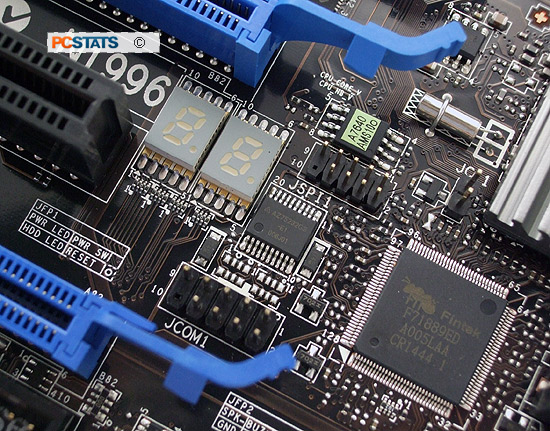
The Port 80 Diagnostics card on MSI's 890FXA-GD70
motherboard.
|
The real fun comes from the MSI 890FXA-GD70's overclocking dial, which
will crank up the system bus speed directly from the motherboard. Turn the OC
Gear button on, adjust the dial to your needs, and then hit the OC Gear button
again to lock the settings in place.
The four touch sensitive, non-haptic buttons on the bottom-right corner
of the PCB are for 'Green Power' mode, the 'OC gear' and 'OC Dial'
when enabled, and standard power and reset. Since the touch sensitive buttons are dead flat,
it's very easy to accidentally trigger the adjacent button. Still, they are kind of cool, and are only
activated by the touch of a finger.
Now let's take a look at the 890FX chipset and see exactly what it can
do...

